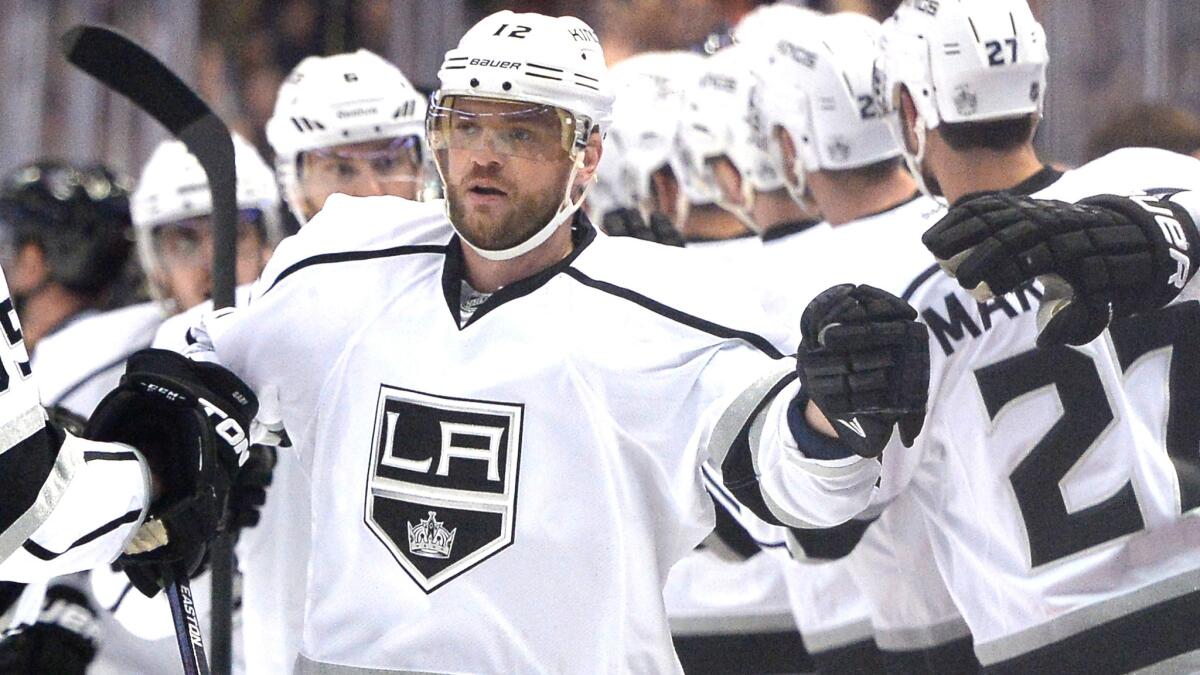Column: To be Cup contenders, Kings and Blackhawks had to outsmart salary cap

- Share via
From Chicago — Kings General Manager Dean Lombardi knew his team needed a productive left wing in order to go far this season and he knew Columbus winger Marian Gaborik might be available, but Lombardi had season-long salary cap problems and Gaborik’s salary was $7.5 million.
To make a trade work and keep the Kings under the cap, Columbus would have to keep some of Gaborik’s remaining salary. “Because they could only take 50% we were within $50,000 of making it,” Lombardi said.
Lombardi acquired Gaborik on March 5, and if the rest isn’t quite history, it illustrates the maneuvering necessary to sustain excellence in a salary-cap system.
Without Gaborik, whose nine goals is tops among playoff goal scorers, the Kings wouldn’t have made it to the Western Conference finals for the third straight season and continued their most successful era in club history. The Chicago Blackhawks are right there with them, on a parallel track that has crossed the Kings at this stage for the second straight season.
The Kings are seeking their second Stanley Cup title in three seasons, while the Blackhawks are pursuing a third Cup triumph in five seasons. The Blackhawks are trying to become the first repeat champion since the 1997 and 1998 Detroit Red Wings, emphasizing the challenges of sustaining a contender.
Dynasties like the Montreal Canadiens of the 1950s, ‘60s and ‘70s, the New York Islanders of the early 1980s and the Edmonton Oilers of the late 1980s are a thing of the past. Successful players want raises, and the math doesn’t work under a hard salary cap.
The rise of the Kings and Blackhawks from obscurity to the upper echelon is a credit to the work done by Lombardi, Blackhawks GM Stan Bowman, and Bowman’s predecessor, Dale Tallon. Players have taken less money than they might have gotten on the open market because they want to stay with winning teams.
“Everybody when they got a chance to play for the Blackhawks, for any player it’s great opportunity,” Chicago winger Marian Hossa said Monday, a day after the Blackhawks opened the West final with a 3-1 victory over the Kings.
“I’m sure the Kings are a great organization also. They did an excellent job the last few years. They did it three times in a row. It’s just amazing these two teams are battling for the West again.”
Both teams have experienced many bumps on the road back to prosperity.
The Blackhawks missed the playoffs from 2003 through 2008 and lost in the 2009 conference finals before ending a 49-year Cup drought in 2010. They were so squeezed by salary-cap constraints that they had to part with about a dozen players, but they rebuilt around prospects and prevailed again last season.
The Kings missed the playoffs from 2003 through 2009 and lost in the first round in 2010 and 2011 before winning the franchise’s first Cup title in 2012. Like the Blackhawks, the Kings’ strategy was to draft and develop well and trade assets to fill holes. Both found gems in the draft, with Chicago taking Norris Trophy winner Duncan Keith in the second round and finding strong secondary players. The Kings found a relative unknown named Anze Kopitar in the 2005 entry draft and also assembled a fine supporting cast around a foundation of skill players.
In Game 1, the Kings dressed 12 players they had drafted — some, like Drew Doughty, among the first picks because of the team’s previous awful seasons — two free agents, and six players acquired through trades. The Blackhawks had 10 players they had drafted — including prime picks Jonathan Toews and Patrick Kane — three players they signed as free agents, and seven added by trades.
“They’re similar to us. They’ve got a nucleus of guys that are similar to our guys and they went through it the same way,” Lombardi said. “They went through hard times to get a top pick like Toews. We get a Doughty. Kane’s a top pick.”
Jarret Stoll, acquired by the Kings from Edmonton with Matt Greene in June 2008, said stability has been an underpinning of the team’s success.
“Then it’s a confidence thing. Just playing well, winning. If you win, you get confidence,” he said. “It’s a culture change, yes, but it’s confidence, winning, putting it all together, knowing that we have the team and not worrying about anything else or any other team.”
Except maybe the Blackhawks, a team so like them in being different from the rest.
More to Read
Go beyond the scoreboard
Get the latest on L.A.'s teams in the daily Sports Report newsletter.
You may occasionally receive promotional content from the Los Angeles Times.






